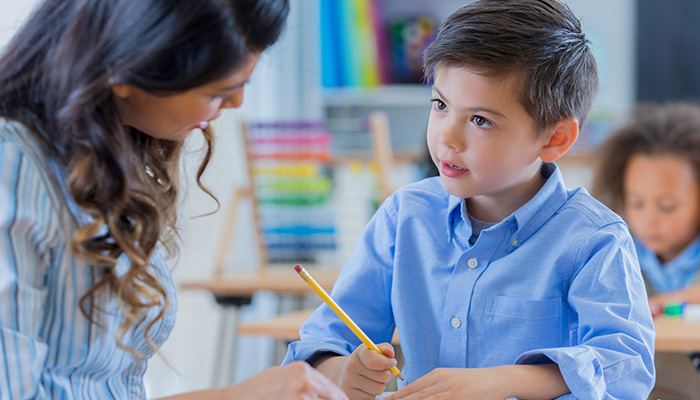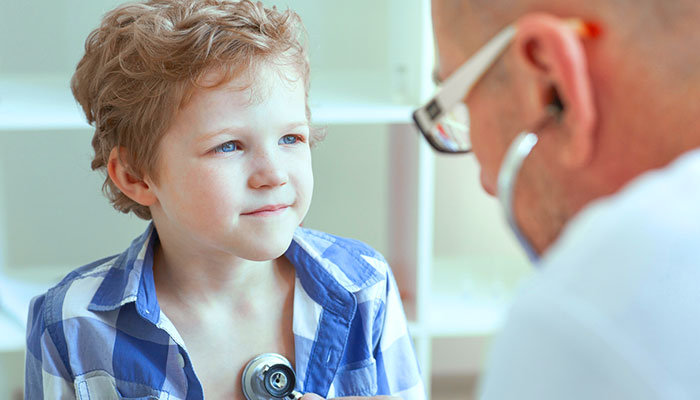Infants from multilingual backgrounds 'talk' less with their early childhood educators, which could slow their language development, according to a new study. But researchers also found the children catch up over time.
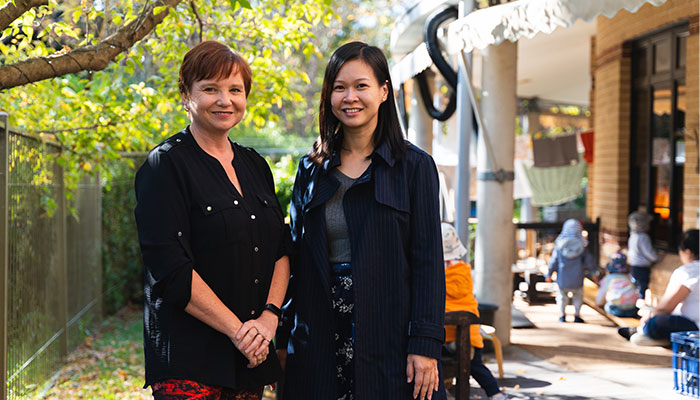
Wordplay: Professor Sheila Degotardi (pictured left) and Dr Fiona Zheng (pictured right) investigated infant language development in early childhood centres as part of the MQ TaLK study.
The study, published in the journal Infant Behaviour and Development, is the first major analysis from the Australian Research Council-funded MQ TaLK project, currently the biggest study in Australia to investigate how early childhood education settings support infant and toddler language development.
The researchers found that English-speaking infants from 12 to 18 months old in early childhood centres ‘vocalised’ (spoke or made speech-like sounds) more than multilingual infants.
“The extent to which children vocalise in infancy strongly predicts their language development and it also affects how much they are spoken to, so these are significant findings,” says Professor Sheila Degotardi, who is the Director of the Centre for Research in Early Childhood Education at Macquarie University.
“However, we found that as multilingual children spent more time in their early childhood centre, the difference in vocalisation rates between the two groups disappeared,” she says.
Words count
The research team studied over 180 children aged 12 to 18 months old attending early childhood centres, 45 per cent of whom were multilingual, and compared language environments between monolingual and multilingual children in their homes and in early childhood centres.
“This is a very comprehensive study, gathering data on aspects of language environments such as how many words infants hear from their parents or educators. How many vocalisations they produce, and how many conversational turns they are engaged in," says Professor Degotardi. "We also looked at the quality of those language interactions."
In general, educators talked more to female infants than to male infants. Regardless of their multilingual status, all girls were exposed to significantly more language than boys.
Along with video recordings, the researchers had participating children wear a specialised recording device called LENA (Language Environment Analysis), which records their speech interactions across a full day.
Postdoctoral research fellow and study co-author Dr Fiona Zheng analysed the LENA data.
“We wanted to find out about how the language environments might differ for children who are growing up speaking or hearing a language other than English,” she says.
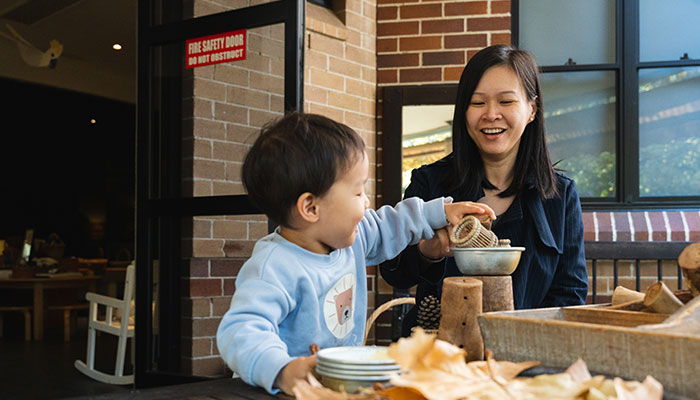
Conversations: Dr Fiona Zheng (pictured) investigated potential differences in how educators and children talk to each other depending on the infants' language background.
The findings are particularly significant because the 2021 Census showed that nearly half of Australians (48 per cent) had a parent born overseas, 27 per cent were born overseas and 22 per cent spoke a language other than English at home.
The study suggests that early childhood centre attendance during infancy may support early language development, Dr Zheng explained.
“In the future our analysis will look at how four year-olds use their language, from how they construct a story narrative to how they describe things in a picture. And we also plan to look at how they use language to express what they know and understand,” says Dr Zheng.
Shining a light
Professor Degotardi says this study could shed light on Australian data showing that children from non-English speaking backgrounds often start school with weaker language skills than their English-speaking peers.
“Early childhood educators often ask about aiding language development in young children, and how to support children from non-English speaking backgrounds – this project is all about getting that data,” Professor Degotardi says.
The study takes a deep dive into language interactions in early childhood, she says.
“We’re observing how educators might consciously or unconsciously adjust the ways they interact with children depending on their language background, and whether the children themselves vocalise differently depending on their language background.”
"These findings suggest that educators need to be aware of individual differences in language environment experienced by multilingual and monolingual infants," says Dr Zheng.
Group sizes matter
The study also found that infants in smaller groups also vocalised more frequently than those in larger groups.
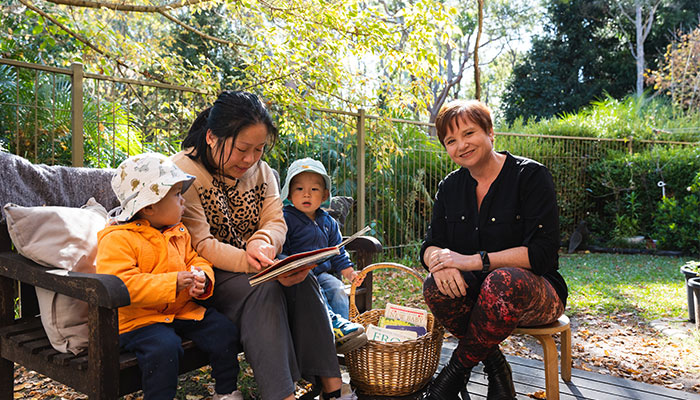
Impact: Early childhood education plays a critical role in language development for a large group of Australian children, says Professor Sheila Degotardi (pictured right).
“There is no limitation on group size in Australia and the largest class size we studied was over 25 children – these big classes are likely to be noisier and busier, which runs the risk of impacting on the quality of their interactions with educators,” Professor Degotardi says.
One surprising result from the study was that the number of words adult carers spoke differed according to the gender of the infant.
“In general, educators talked more to female infants than to male infants,” says Professor Degotardi.
“Regardless of their multilingual status, all girls were exposed to significantly more language than boys.”
This finding was a sideline to the current research, but will be explored in more detail in future, Professor Degotardi says.
“Could female infants be already socialised into wanting more language interactions than male infants by this young age? Is there a genetic predisposition, or even unconscious bias on behalf of educators – there’s a number of avenues to explore further.”
Bridging the gap
The study highlights the importance of understanding multilingual infants' language environments in early childhood education settings, says Professor Degotardi.
“Early childhood education plays a critical role in language development for a large group of Australian children,” she says.
“Our research highlights the need for educators to be supported so they can focus on providing a rich and varied language environment for all children regardless of their multilingual status.”
That should include frequent conversational turns, rich experience with adult talk and the encouragement of infant vocalisations, she says.
"These findings should encourage centres to have smaller group settings to support frequent opportunities for one-on-one interaction with educators," Professor Degotardi says.
Professor Sheila Degotardi is the Director of the Centre for Research in Early Childhood Education, Macquarie University.
Dr Fiona Zheng is a Postdoctoral Research Fellow, Macquarie School of Education.

